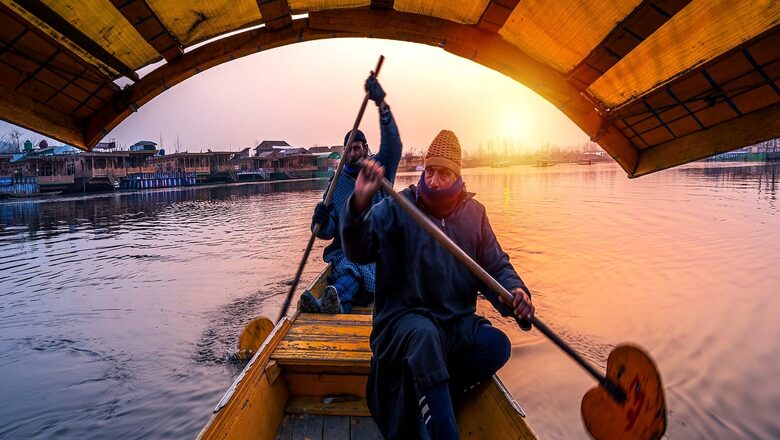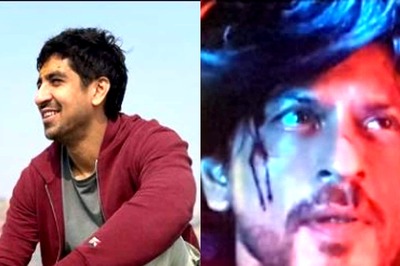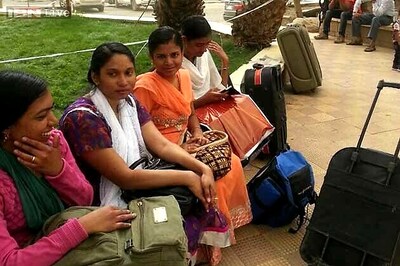
views
From an electoral perspective, 2023 is being seen as a make-or-break time for most of India’s political parties, in particular, the Bharatiya Janata Party (BJP) and the Indian National Congress (INC).
Between March 2023 and January 2024, nine states – Meghalaya, Nagaland, Tripura, Karnataka, Mizoram, Chhattisgarh, Madhya Pradesh, Rajasthan and Telangana will be holding Assembly elections, with general elections scheduled between April and May. An interesting highlight of this political battle is the BJP’s determined showcasing development and progress in Kashmir as its stellar achievement.
Over the last few days, ministers of the Narendra Modi-led NDA government at the Centre have left no stone unturned to highlight the administration’s positive handling of developments in India’s strategically important border regions. Most notable is Union Home Minister Amit Shah, who has pointedly ensured that Kashmir’s development occupies the mind space of the common man, whether it’s through addressing political rallies in Meghalaya, Nagaland, Tripura and Karnataka, or by spending “relaxed” time with Kashmiri children in Pune, Maharashtra.
The question, therefore, arises as to why Kashmir continues to be so important to the current Indian discourse. Is it because of its physical contiguity, water assets, physical access to the once great economic Silk Route (starting from China, passing through Europe and into Central and South Asia), or its geo-political, monetary, strategic and security significance?
For Shah though, achieving a balance between having a serious interaction on Kashmir and encouraging Kashmiri children to share their candid views with him regarding their future, in their once troubled homeland, seems second nature.
Sarhad, a Pune-based NGO had recently invited Shah to interact with 84 Kashmiri students; all of them belonging to families that were attacked and mindlessly eliminated by terrorists. Being acutely aware of Shah’s tough-as-nails image when it comes to handling Kashmir, the kids were naturally nervous. However, to their surprise, Shah was anything but tough. Asking all dignitaries, including Maharashtra Chief Minister Eknath Shinde to step aside, he whisked away the children to another room to have a heart-to-heart conversation with them.
He put the children at ease by telling them that he was feeling much more relaxed and less tired in their presence. After hearing Ruqaiya Maqbool singing ‘Namokar mantra’, Shah asked the young girl whether she understood the mantra’s meaning. Nodding in the affirmative, Ruqaiya told him that it was a Jain community hymn praying for world peace. Shah’s engagement with the children was constructive and marked by positivity.
Joginder Singh, a commerce graduate, whose entire family of 15 was wiped out by terrorists in Doda district just because they were trying to save villagers, told the home minister he aims to join the forces to avenge the massacre of his family. After sympathising with him, Shah advised Joginder that “revenge is not a good idea” and instead extolled him to concentrate on academics so that he could choose a field of work and aim to lead Kashmir and India to greater heights.
On being told that they were missing their homes, Shah asked them not to worry as they would return sooner than later and see a marked improvement in Kashmir. He told the children, “We want Kashmir should develop in such a way that Kashmiris do not have to go outside for education and employment, but children from the other states should come to J&K for study and work.”
The home minister further said that it was a pleasant experience for him to see Kashmiri children taking to Indian classical music like ducks to water and promoting peace and brotherhood, which was the need of the hour.
Elsewhere in Delhi, Haryana, Maharashtra (Nagpur) and Tripura, Shah showcased his “bulldog” image with aplomb, clearly stating that J&K statehood would be restored after the elections are done and dusted. On abrogation of Article 370, he said the BJP and its predecessors have consistently maintained that this Article is a Constitutional aberration and thus needed to be removed to facilitate peace, security and development. He added that terrorist activities in the UT have dropped significantly because of that landmark and decisive move.
Shah told a news agency, “In Jammu & Kashmir, terrorism-related figures are at their lowest today. Crores of tourists and pilgrims are visiting the region now. There is development. There is all-round progress, just see the statistics. Without hesitation, I can say there is a visible change. Elections at all levels of governance have been taking place under the BJP. For the last 70-odd years, we haven’t had these polls, or if we have had them, they have been sporadic. We are determined to put an end to the dynastic political culture that prevails in J&K. It is these dynasts who are responsible for allowing terrorism to flourish and prosper.”
J&K, he said, is in need of new leadership and that will emerge from the recently held Panchayat polls. In a riposte to the Opposition, which has been questioning the Modi government’s initiatives and policies in the Parliament, the home minister reminded them that it was they who had spoken of a bloodbath taking place in J&K post Article 370’s revocation, not the BJP or its allies. “We have not only stopped the spilling of blood, but also incidents of stone pelting and protests. Over 1.8 crore tourists have visited J&K in the last year,” Shah emphasised.
The Modi government has been able to take hard decisions like abrogating Article 370 because it has never espoused vote-bank politics. J&K, he said, has received Rs 56, 000 crore as an investment in the past three years alone. When you see that the state has received only Rs 12,000 crore over the previous 70 years, this current figure speaks volumes about what is being done in the name of development, he added.
Joining Shah in emphasising the importance of Kashmir and its people in the national context is External Affairs Minister Dr S. Jaishankar. Taking part in J&K’s first International Education Fair in New Delhi, Jaishankar said the event must just not be seen as or limited to being an education-only initiative, but as a platform to connect every Kashmiri with the national mainstream.
Complimenting Sher-e-Kashmir University of Agricultural Sciences and Technology (SKUAST) Kashmir and the Indian Council for Cultural Relations (ICCR) for their collaborative effort, the minister further reminded the audience of the successful process of change taking place in J&K, the benefits of which would percolate down to the people, especially its youth. “People of J&K being in the national mainstream is extremely important….by doing so, they would connect with the rest of India and the International mainstream,” he said.
“India has projects done or under delivery in 78 countries…so, if our relationships are so extensive, investments are so deep and networking is so good, we need to see that translated into a greater flow of international students to India,” Jaishankar said.
He said it is absolutely essential that India’s youth are fully aware of what’s happening in the world and there is no better way to do that than having interactions with international students.
Union Human Resource Development (HRD) Minister Dharmendra Pradhan praised the UT administration for ushering in what he described as a “new dawn of development”. He promised that his ministry would facilitate the globalisation of SKUAST-Kashmir in times to come.
Minister of State Dr Jitendra Singh said, “Jammu and Kashmir has a rich legacy of unexplored agricultural avenues, Aroma Mission and Purple Revolution, which imparts in it the potential of being the torchbearer of the Agri Start-Up movement in India.”
J&K Lieutenant Governor Manoj Sinha said he hoped to transform J&K into a favourite destination for students, travellers and entrepreneurs. He also observed that the initiative of SKUAST-Kashmir will set an example for other universities of the country as well.
With over 150 higher education institutions, two central universities, seven state universities, two AIIMS, IIMs, IITs, NIT, NIFT, IIMC and two Agriculture Science and Technology universities, Jammu and Kashmir is emerging as a favourite destination for students.
ICCR President Dr Vinay Sahasrabuddhe assured ICCR’s cooperation and support to J&K for organising exchange programs for artisans and fairs to realise the aspirational goals of J&K vis-à-vis other states and other countries.
J&K is moving ahead at a very fast pace and the results have started to show. Consequently, there is discernible enthusiasm amongst the people of Kashmir as it’s apparent that the worst is over.
The author is Editor of Brighter Kashmir, Author, TV commentator, political analyst and columnist. Views expressed are personal.
Read all the Latest Opinions here


















Comments
0 comment